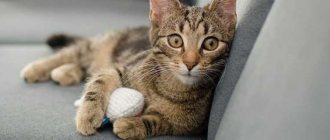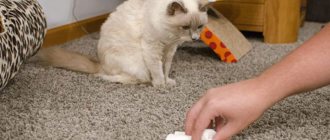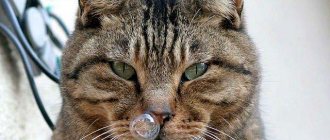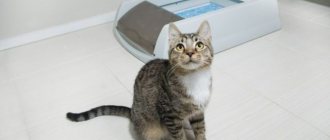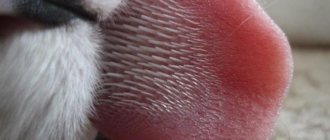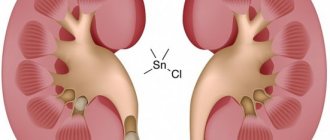If your cat's urine smells like ammonia, this may be a sign of a serious inflammatory disease or hormonal imbalance. You should not ignore this problem and try to fix it yourself. To make an accurate diagnosis, it is enough to take blood and urine tests of the kitten. Therapy for disorders includes medication and a balanced therapeutic diet.
Reasons for appearance
Under normal conditions, cat urine has a strong odor. This specific aroma is caused by a mixture of ammonia and secretion from the gonads. But sometimes you can feel that the smell has changed from normal to ammonia. A common cause is considered to be dehydration. This happens in animals that eat only dry food and do not have access to water. Another popular reason why a cat’s urine stinks is considered to be the onset of sexual heat. These are non-pathological changes that occur after sterilization or completion of active sexual activity.
Veterinarians say that in domestic cats, the ammonia smell in urine appears due to an inactive lifestyle. This happens due to the fact that with a lack of activity, metabolism deteriorates, and this leads to the sedimentation of sand in the kidneys, and affects the condition of the pet’s biological fluid.
Sometimes the smell of an animal's urine changes due to stress.
A castrated cat's urine smells due to inflammatory processes in the urethra. This occurs because fluid accumulates, forming a urethral plug. Then microorganisms begin to develop in it, which cause such a stench. If, in addition to ammonia, the smell of rot is clearly heard, then the reason lies in hormonal imbalances or cancer. The aroma also changes under the influence of stress, but this is not a serious disorder, and the problem goes away on its own.
Smelly urine in a cat appears due to reasons such as:
- diabetes;
- hypothyroidism;
- hypothermia;
- infection of the oral cavity;
- poor nutrition.
Why does my cat's urine stink?
There are many reasons why stench occurs. And they, as a rule, can be traced to one degree or another in any pet and appear over time. Even a once healthy, cheerful and cheerful pet can at any time encounter such an illness.
Puberty
It is absolutely normal for any animal to secrete special fluids that scare off other representatives of the same sex (the so-called marking of territory) and to attract the opposite. Of course, due to the fact that the reproductive and excretory systems are very close to each other, it is likely that these secretions enter the urine and are excreted along with it. Often cat pheromones have a specific odor that seems extremely unpleasant and disgusting to us humans.
Associated symptoms
The main sign of the disorder is cloudy urine in the cat. This is a symptom of a malfunction in the urinary system. Sometimes the liquid smells fishy or rotten. The pet often goes to the litter box to no avail. His behavior changes: he becomes restless, loses his appetite, although some cats, on the contrary, become sleepy and passive. If the changes were caused by dehydration, then the pet quickly loses weight and does not gain weight, although the diet does not change. There may be incontinence or pain when urinating.
The first signs of the disease
Even before the unpleasant smell from the tray appears, the unhealthy animal begins to show anxiety. It often licks the urethra. He is constantly haunted by the urge to urinate, which often ends in nothing or the release of very small portions of cloudy liquid. When the urine begins to become cloudy, an ammonia smell appears.
An attentive owner should be alert to the following symptoms:
- Drowsiness, passivity.
- Cloudy, foul-smelling urine in the tray.
- Pain when urinating.
- Urinary incontinence or increased urge.
- Lack of appetite;
- Unpleasant ammonia odor of exhaled air;
- Dehydration and sudden weight loss.
- Enlarged kidney, palpable.
Be sure to show your pet to a specialist if you notice at least a few signs of illness from this list.
Diagnostic methods
The reason for this odor in urine can be determined using standard biochemical studies.
In most cases, it is enough to do biochemical tests of urine and blood to determine the disease in a cat. To identify malignant formations or inflammatory processes in the genitourinary system, ultrasound or contrast radiography is performed. Blood pressure measurements or biopsies are rarely ordered.
What to do?
When choosing therapy, it is worth considering the age, sex of the animal and stage of the disease. Often, with diseases of the urinary system, it is impossible to completely cure a cat. This is due to the fact that symptoms often appear late and pet owners seek advice from a veterinarian when the disease has passed the first stage of development. But if you follow all the doctor’s instructions and start the selected therapy in a timely manner, long-term remission can be achieved.
Medications
If a cat is diagnosed with dehydration, then intravenous use of saline solutions is prescribed. For inflammatory diseases, the doctor prescribes antibiotics. To improve the removal of stagnant fluid in the body, diuretics are used. But such drugs should be selected individually for each pet. To maintain the general condition of the body, vitamin therapy is used. If the source of why a cat stinks of urine is severe stress, then veterinarians will prescribe herbal-based sedatives. Such drugs include Fitex and Kot Bayun. In severe cases, surgery is used. If the cat's urine begins to smell unpleasant due to sexual heat, then doctors recommend resorting to castration.
What to feed your pet?
Sometimes, to solve the problem, it is enough to switch the animal to a higher quality diet.
If the cat’s urine begins to smell strongly, but the diagnosis did not reveal any pathological changes in the body, then the cause of the unpleasant smell of ammonia in the urine lies in poor diet. In addition, a balanced diet is important for regaining health after drug treatment. Doctors advise using special high-quality feed. It is advisable not to mix them with fresh products. The following brands are recommended:
- Royal Canin;
- Hills;
- Acana;
- Purina Proplan;
- Eukanuba.
If your pet eats natural foods, you should remember that the diet should be varied. The pungent odor of urine disappears after the balance between carbohydrates and proteins in food is restored. In addition to meat and fish, food includes cereals (buckwheat or rice porridge), vegetables (carrots, zucchini). To improve the activity of the gastrointestinal tract, dairy products are included in the diet: cottage cheese, kefir, yogurt. It is not recommended to give your cat canned, smoked or pickled foods. An adult animal or kitten must have constant access to clean water.
Causes and Treatment for Why Sweat May Smell of Cat Urine
Cats occupy a leading position among animal lovers. Of the hundred people who decide to have animals, about thirty give preference to cats. After all, you don’t need to walk with them outside in bad weather, they are quite clean and do not require special care.
When owners decide to get a kitten, they have no idea that some difficulties may await them. Even if a kitten is toilet trained, this does not guarantee that the smell of cat urine will not appear in the apartment. And as the kitten gets older, the smell will only intensify.
But there is still a way out, and we will talk about this in this article.
You can always get rid of the smell of cat urine!
Very often, as soon as a cat begins to crap in the apartment, the owners think about giving the animal away or throwing away things. However, there is a way out of this situation. You can get rid of the smell of cat urine, and to do this you need to follow simple rules.
- First, you need to find out the reasons why there is an unpleasant odor in your home.
- Secondly, it is necessary to immediately eliminate the sources of odor; there are a huge number of different means for this.
- Thirdly, it is necessary to choose the right detergents.
Sometimes even litter box trained cats stubbornly refuse to relieve themselves in the designated area. And there are the following reasons for this behavior.
It may very well be that the tray is simply not the right size for your pet. It must be chosen so that the length of the tray is one and a half times the length of the cat. Location also plays a very important role. The tray should be installed in a secluded place, since animals, just like people, prefer to relieve themselves in a quiet environment.
Another reason for litter box abandonment could be another cat using the litter box. Therefore, if you have several animals, you need to be prepared for the fact that the number of trays will also have to be increased.
The size of the tray should be suitable for your pet!
And, perhaps, the most common reason for failure is an insufficiently washed tray. Cats are very clean and if she decides that the container is dirty, she may well refuse to go there to relieve herself.
In some cases, cats may perceive a change of environment or a new addition to their family as an encroachment on their territory. Sometimes an ordinary toy can appear to be an invader.
This means that it is urgent to define the boundaries of your territory. Of course, this is done using tags.
Animals begin to urinate on new objects, showing everyone around that this is their property.
Stress
Cats are very sensitive animals, so events such as separation from the owner, moving, resentment or the use of physical force can cause stress in cats.
This risks the fact that your pet may refuse to use the usual tray and start doing it, for example, on the carpet.
Health status
It is also possible that the cat refuses to go to its litter box on purpose. For example, as a cat ages, it may simply not have time to run to the litter box, or it may be due to illness.
We suggest you read: Beekeeping for beginners - videos and tips on where to start
There are often cases when animals try to draw the attention of their owners to their illness by relieving themselves on the linoleum.
Therefore, if you notice such behavior in a cat, do not rush to scold him, but show him to the veterinarian.
If you have a cat, be prepared for the fact that he will definitely want to mark the boundaries of his territory.
Of course, this is done by applying urine to interior items, clothing or walls. It is in this case that the smell of cat urine is especially noticeable.
Moreover, it can even come from clothing, which can be noticed by colleagues or acquaintances. And this, you see, is not always comfortable.
This is how cats and cats place their territory!
The reasons for such a pungent smell of the cat's sanya are that the tags contain an odorous secretion, the purpose of which is to convey to the animals that this territory already has its owner.
It turns out that cat urine has the ability to quickly turn into a crystalline state, and such crystals are almost insoluble in water and it is very difficult, and sometimes impossible, to remove them with ordinary detergents.
If your pet does relieve itself in the wrong place, then try to clean up the puddle as soon as possible. The longer urine remains uncleaned, the stronger the odor it will produce. In addition, after drying, the stain will be invisible, but the smell will not go away. And such odorous traces can provoke a cat to repeat sabotage.
To figure out what is the best way to remove the smell of cat urine, you need to understand what it consists of. And its composition is quite simple:
- Urea;
- Urochrome;
- Uric acid.
The first two components easily dissolve in water and are washed off, but uric acid turns into crystals, which, after each increase in humidity, begin to emit a smell again and again.
First of all, you will need to wipe up the puddle on the floor with a rag or paper napkins. If you need to remove urine from a carpet or sofa, then you need to thoroughly blot the stain several times with a dry paper towel or rag. The same applies to removing odor from shoes.
To clean urine, it is best to use products with enzymes!
If the stain has already dried, you can lightly moisten it with water and blot it. The task is to quickly remove as much urine as possible without increasing the size of the stain. After this, you can start using special tools.
You can destroy the consequences of cat crime using special products that can be purchased at pet stores or by using ordinary detergents. Please note that you should not try to remove the odor using several different substances, as they may begin to react with each other and will not give the desired effect.
Enzyme-containing products, such as Pemolux, must be applied according to the directions on the package. Most often, this will be enough to completely eliminate the unpleasant odor.
If you don’t have a product with enzymes on hand, and there’s no way to quickly buy it, then how to remove the smell of cat urine? The means available in every home will come to the rescue. You need to mix one and a half glasses of water and half a glass of ordinary vinegar, then pour the resulting solution over the stain. Then wait about five minutes, blot it and sprinkle with soda.
If there is no special product, then you can use the available products that are in every home!
After this procedure, you will need to dilute one teaspoon of dishwashing detergent in one hundred milliliters of hydrogen peroxide. It is advisable to test the resulting solution on an unnecessary rag or an inaccessible area of the carpet to make sure that the carpet does not fade. If the test is successful, feel free to apply it to the stain with a brush.
Now you just need to wait a couple of hours until it dries completely and vacuum the carpet or sofa. In especially severe cases, the above procedure must be repeated until the odor disappears completely.
You can also use potassium permanganate
Another remedy for combating unpleasant odors is potassium permanganate. To do this, you will need to dilute a very weak solution and treat the stain. However, you need to use it very carefully, since by solving an odor problem, you can create a new one - stains may remain on textile surfaces.
It is strictly forbidden to use ammonia-based products. Its pairs will attract the cat to relieve itself in this place again and again.
The same goes for chlorine. Moreover, bleach is very aggressive and can damage the surface being cleaned.
You can get rid of the smell of cat urine from a car or person in a variety of ways. Some happy cat owners advise using perfume, and to some extent they are right, since ethyl alcohol can dissolve uric acid crystals. However, such a tool has a fairly high cost.
Cheaper options for removing cat odor:
- Potassium permanganate;
- Vinegar;
- Lemon juice;
- Hydrogen peroxide;
- Weak iodine solution.
Germicidal soap can also be used to kill bacteria.
This unpleasant odor is caused by bacteria that rapidly multiply in unclean cat urine. Therefore, when choosing products to get rid of odor, it is necessary to take this fact into account. Any alcohol-containing products, mouth rinses, soda, and glycerin-based laundry soap are suitable for this.
If you do not want to purchase special products and want to limit yourself to household supplies, then for maximum effect, try to use several methods. For example, you can first treat the stain with vinegar, then sprinkle it with baking soda. After this, you need to treat it with hydrogen peroxide and laundry soap.
If you are just planning to get a kitten, then you can give preference to a special breed. To choose, consult with experts involved in breeding cats. They will advise which breed is best to choose, and also give recommendations for care. Nowadays, many breeds have been bred whose representatives have no smell or do not mark at all.
For example, you can opt for sphinxes. Although they have a somewhat specific appearance, they do not smell and can be used by people suffering from allergies.
Now you know where the unpleasant smell of cat urine comes from, the reasons why cats refuse the litter box, and how to deal with the smell of urine. Therefore, we hope that in the future you will not have problems with an unpleasant odor in your apartment.
How to remove the smell?
An unpleasant aroma on furniture can be easily removed with a prepared vinegar solution.
To remove the smell of cat urine from furniture, use a vinegar solution. It is diluted in a ratio of 1 to 3 and applied to objects. If your clothes stink, use Belizna bleach. This product is also used to clean cat litter. To reduce the smell, use lemon juice or citric acid. To combat the pungent odor of urine from kittens or adult cats, sprays are applied to objects: “Himola”, “True Friend” or “Laina”.
Prevention
To maintain health, it is important to follow the correct diet: protein foods should be combined with carbohydrates. The cat should always have access to water, especially in the hot season. It is advisable to monitor the cat’s behavior and notice the slightest changes in its character. This will help to detect the development of the disease in time. It is also worth protecting the animal from stress: do not leave your pet alone or with strangers for a long time, carefully transport it from place to place. If your cat's urine smells strongly, you should immediately contact a veterinarian. After treatment, the pet must undergo scheduled checks every six months.
Cat urine smells like ammonia
First you need to understand what substances a cat’s urine consists of and what is included in its composition.
The main substances are urea, uric acid, creatinine and electrolytes. In addition, cat urine contains bilirubin, ketones, and nitrates. Urea (CH4N2O) is highly concentrated in cat urine. Urea is a derivative of ammonia, the end product of amino acid metabolism. Ammonia is a toxic substance that is constantly produced in the cat’s tissues, but during the metabolic process it is quickly removed from the bloodstream by the liver. An excess of ammonia in the body seriously affects the CAT'S HEALTH and the functioning of the central nervous system (CNS). Urea synthesis occurs in the liver, it occurs in several stages involving a number of enzyme systems.
Synthesis is accompanied by the absorption of energy, the source of which is ATP. What causes a strong ammonia odor in cat urine? As you can see, urine contains ammonia derivatives. The higher the urea concentration, the stronger the ammonia odor. The concentration of urea in urine is directly related to the amount of water the cat consumes.
The more the animal drinks, the less concentrated the urea.1 A strong ammonia odor in the urine may indicate dehydration in the cat. Make sure your cat is drinking enough. Cats generally prefer clean water, and even better if the water is running.2 Another important factor is the composition of the cat’s diet.
With a high amount of protein in the cat's food (for example, consuming more chicken meat). Chicken protein is perfectly absorbed in a cat’s body (about 85%), but a large amount of chicken in the diet can cause some problems. When feeding natural food, the cat's diet should be varied. Read more about feeding cats and kittens here.
3 One of the reasons why your cat's urine smells strongly of ammonia can be stress. Stress in a cat can be caused by various factors. Read more about cat stress here. Now about the more serious reasons for the smell of ammonia in cat urine. If the cat drinks enough water, eats a balanced diet, and the smell of ammonia is very strong, then you need to consider the possibility of a bacterial infection in the cat's body.
4 Many bacterial diseases of the cat's urinary tract produce an increased odor of ammonia in the urine. In this case, it is better to immediately go to the veterinarian, undergo the necessary examination, take a GENERAL AND BIOCHEMICAL blood test, and a specialist will prescribe a course of treatment. As a rule, such diseases are treated comprehensively with the prescription of antibiotics. In conclusion, I would like to wish you and your pets good health!!!
Chistyakov Igor, Bengal cat nursery HILDABENG (Hildabeng).
A cat's urine is one of the first and most visible indicators of your pet's health. By paying attention to its color and smell, you can quickly notice the development of any diseases and provide the animal with the necessary help even before it all becomes more serious. Moreover, it is difficult not to notice the unnatural and strong smell of urine in a cat, and then all that remains is to find the cause of the problem.
In a healthy cat, the urine has an almost transparent, slightly yellowish color, and its smell, although it contains an admixture of ammonia, is not too strong. Of course, each owner has an approximate idea of the smell of his own pet, and it is important to understand that the occurrence of various noticeable changes can be associated with a number of reasons.
Under normal conditions, urine in cats is transparent, has a yellowish tint and a specific odor. The characteristic ammonia smell in cat urine comes from substances that are derivatives of ammonia. It is uric acid that is the persistent part of urine, insoluble in water and alcohol.
In addition, cat urine also contains urea, which is a sticky substance that dissolves well in water, and urochrome, which is responsible for the color of the discharge.
The reasons why an animal refuses to go to the litter box are varied, but the main ones are:
- Incorrectly selected tray. An animal may refuse to go to relieve itself in a litter tray simply because there may be the wrong filler, or the height of the sides of the litter box is too high. Additionally, the location of the cat litter box also plays an important role. So, if the cat litter box is in a crowded place or near noisy household appliances, the animal may refuse to go to the toilet there.
- The emergence of new smells. If a cat smells a new smell coming from shoes or things, it may mistake it for an encroachment on its territorial boundaries. Marking territory is an important activity for a cat, so if your pet loves to mark shoes, it may not like the smell coming from boots or shoes.
- Stressful situations. Cats are emotionally sensitive, sensitive to changes in the owner’s mood, feel sad when he is absent for a long time, and physical punishment is generally contraindicated. As a protest, the pet may start peeing on the owner’s favorite sofa or under the bed.
- Marking territorial boundaries. Cats are possessive and tend to mark territory. In this case, the animal does not make a full-fledged puddle, but only splashes the furniture a little. This behavior can also occur during the period of sexual hunting to attract a sexual partner. Cats also mark territory when there are several animals in the house, thus indicating who is boss.
We suggest you read: Mekong Bobtail breed description - Drugdoma
In some cases, owners notice that the smell of cat urine becomes too strong and unpleasant, even if the cat goes exclusively to the litter box. The appearance of a strong smell of urine may be associated with pathological conditions of the animal’s internal organs. Urine can smell for the following reasons:
- Dehydration of the body - as a result of an insufficient amount of fluid in the body, the concentration of uric acid increases, and the smell accordingly becomes much more concentrated and sharper.
- Violation of metabolic processes. With an unbalanced diet, especially if there is a large amount of protein in the diet, a strong ammonia smell may appear from cat urine.
- Diseases of the urinary and reproductive systems. Often the cause of increased unpleasant odor in cat urine is inflammation in the kidneys, bladder, or urolithiasis. It is important to promptly contact a veterinarian to correct the problem. Otherwise, degenerative processes that are difficult to treat may begin in the animal’s body.
- Diabetes mellitus, malignant neoplasms, hyperfunction of the thyroid gland. All these diseases lead to serious changes in the body, affecting functionally important organs. Urine smells like ammonia, acetone, or has a putrid odor.
